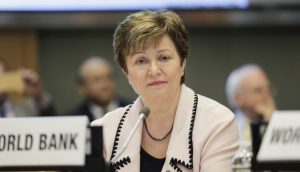IMF unveils $50 billion emergency facilities to help address coronavirus
The International Monetary Fund (IMF) announced on Wednesday about $50 billion rapid-disbursing emergency financing facilities to help low income and emerging market countries fight the coronavirus.
Of this, $10 billion is available at zero interest for the poorest members through the Rapid Credit Facility, IMF added in a statement.
IMF Managing Director Kristalina Georgieva said on CNBC’s “Squawk Alley” that the money is available “immediately” and is for low-income and emerging market countries.

Most of the money will be interest-free, and countries do not need to have a preexisting programme with the IMF to participate, Georgieva added.
“What we’re doing right now is reviewing country by country what are the financial needs, and engaging with these countries to make sure they are aware of this resource and we can immediately respond to them,” Georgieva told CNBC.
“We’re in an early stage of engagement, but I can assure you that we will act very quickly as requests come.”
There are over 90,000 confirmed cases of the flu-like virus around the world, and the outbreak has extended to six continents. The epidemic has driven to tightened travel restrictions in main economic hubs in China and Italy.
The IMF would like to see the money used first to boost health-care systems and then for targeted fiscal stimulus programmes and to help liquidity, Georgieva added. The Fund is also cooperating with the World Bank to help countries get some of the medical equipment, such as medical masks and respiratory equipment, that is used to combat coronavirus.
The World Bank earlier on Monday announced a $12 billion programme to help poor nations deal with the health and economic consequences of the coronavirus outbreak.
“We think it is now the time to put in place precautionary measures should the outbreak become more severe,” IMF official said.
She stated earlier on Wednesday at an event in Washington, D.C., that, “We are faced with a generalised weakening in demand, and that goes through confidence and through spillover channels, including trade and tourism, commodity prices, tightened financial conditions.
“They call for an additional policy response to support demand and ensure an adequate supply of credit,” Georgieva added.
Earlier on Tuesday, the IMF and the World Bank decided to adopt a “virtual format” for their spring meetings – taking place this year on April 17-19 – instead of convening in person in Washington amid growing concerns about the fast-spreading coronavirus.
“Given growing health concerns related to the virus, the Management of the IMF and World Bank Group and their Executive Boards have agreed to implement a joint plan to adapt the 2020 IMF-World Bank Spring Meetings to a virtual format,” the leaders of the two Washington-based institutions said in a joint statement.


